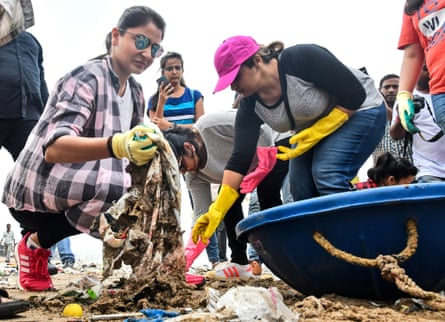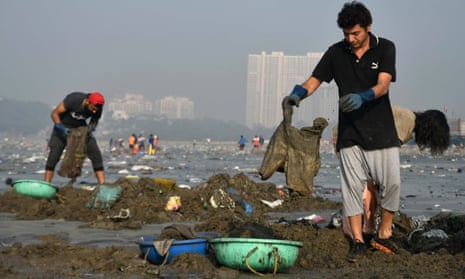A beach in Mumbai is looking much cleaner thanks to the efforts of local people to remove a tide of plastic waste that appears on the shore.
A regular group of people, including children, use equipment donated by Bollywood stars to scour a 3km stretch of Versova beach every weekend, and have collected more than 12,000 tonnes of plastic since 2015.
Their work highlights the growing problem of plastic in the seas – blamed for killing millions of sea creatures every year, and threatening the plankton and small fish at the foundations of the marine food chain.
Researchers have calculated that 90% of the plastic refuse deposited in the world’s seas – dominated by tiny pellets, plastic bags and packaging – comes from just 10 rivers: two in Africa and eight in Asia.
They blame poor or non-existent waste collection, and lack of education among the tens of millions of people living upstream in chronic poverty.
While considerable areas of the beach are still polluted by plastic, the Sunday afternoon clean-ups have achieved a lot: once plastic reached waist-high, now couples stroll and children can play cricket on the shore.
“We are clearing up the mess created by our parents,” 15-year-old Titiksha Kabra told Sky News.
“If we don’t want our generation to face the problem of plastic, we have to come here and clean it up.”

Plastic pollution has fast risen up the environmental and political agenda, and the issue was given prominence by the latest BBC Blue Planet series presented by David Attenborough.
Highlighting the 8m tonnes of plastic added to the oceans every year, Attenborough said: “Surely we have a responsibility to care for our planet. The future of humanity, and indeed all life on earth, depends on us.”
Many countries have legislated to force shops to charge for plastic bags, a measure that in the UK saw a reduction in use of as much as 85%.
The study of the most polluting rivers listed the Yangtze river in China as the most polluting, while two Indian rivers, the Indus and the Ganges, were also on the list.
